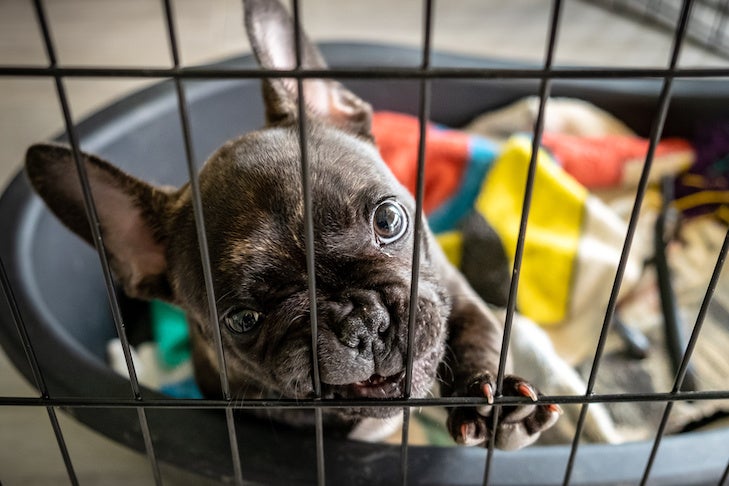In July 2022, the World Health Organization declared the outbreak of monkeypox a global health emergency. Monkeypox is a zoonotic disease, which means that it can spread between animals and people. It still is unclear how easily the monkeypox virus is spread between people and animals. As with all zoonotic illnesses, confirmed infected people with monkeypox should avoid interaction with all animals, including their own pets, while exhibiting signs of illness.
Can Dogs Get Monkeypox?
At this time, there have been no confirmed cases of monkeypox in domestic dogs or cats in the United States, notes Dr. Jerry Klein, DVM and the Chief Veterinary Officer of the American Kennel Club. However, according to The Lancet, a family dog has tested positive for monkeypox virus in France just 12 days after the owners showed symptoms.
The dog had mucocutaneous lesions after co-sleeping with the couple. While this is potentially the first human-to-dog transmission case recorded, there has yet to be dog-to-human or dog-to-dog cases.
Can Other Animals Contract Monkeypox?
Yes. Klein cites a 2003 outbreak that involved humans contracting monkeypox after handling a shipment of prairie dogs. “It was the largest outbreak of animal-to-human monkeypox virus so far in this country,” he says.
According to the Centers for Disease Control and Prevention (CDC), “We should assume any mammal can be infected with [m]onkeypox virus.” Rodents that can contract the virus are squirrels, marmots, groundhogs, chinchillas, and giant-pouched rats; others, like mice and rats, are designated as being “possibly” able to contract. Insectivores like hedgehogs and shrews, plus non-human primates such as monkeys and apes, can also contract monkeypox. It is not known whether domestic and farm animals and other types of wildlife can do so.
Can Dogs Spread Monkeypox?
Theoretically, dogs can spread monkeypox, but it is unlikely, according to the American Veterinary Medical Association (AMVA). The CDC adds that “infected animals can spread [m]onkeypox virus to people, and it is possible that people who are infected can spread [m]onkeypox virus to animals[.…]”

How Can Dog Owners Protect Pets from Monkeypox?
“Though this has primarily been a human outbreak at this point, there may be occurrences where people who have been confirmed with monkeypox may have animals in their home,” Klein says. If you test positive for monkeypox, here are guidelines provided by the CDC for pet care:
- Avoid coming into close physical contact with pets if possible
- Cover skin rash with long garments or gloves and wear a mask and other PPE
- If you need to care for your pet, practice good hygiene by washing your hands or using alcohol-based hand rubs before and after
- Keep potentially contaminated articles (like clothing or towels) away from your dog and their possessions (like toys or bedding)
- Cover your rash with gloves and don’t let pets come into contact with bodily fluids, an uncovered rash, or used bandages
- Do not use chemical disinfectants, alcohol, hydrogen peroxide, sanitizer, or other industrial cleaners on your dog, as they are deemed unsafe for pets
What Do I Do If My Dog Has Been Exposed to a Confirmed Monkeypox Case?
Contact your vet immediately if your dog is exhibiting a new rash or two or more clinical symptoms. Separate your sick pet from other animals and minimize their contact with other humans and animals for three weeks after they get sick or until they are fully recovered.
Factors to watch for include:
- Lymph node enlargement
- Lethargy
- Crusty nasal discharge
- Vesicular skin legions
- Nasal/eye secretions
- Coughing
- Bloating
- Rash

Other nonhuman primates with monkeypox have exhibited symptoms like conjunctivitis, lack of appetite, and runny noses. If your dog exhibits two or more symptoms plus a rash or has close contact with someone that has a probable confirmed case of monkeypox, get them tested.
Following these guidelines can help keep you and your canine companion safe from monkeypox.

